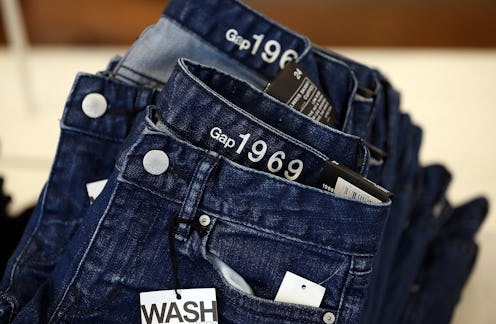Fashion
You've Been Washing Your Jeans All Wrong
You may not think you wash your jeans enough, but chances are you're actually throwing them in the laundry basket too often. According to Chip Bergh, CEO of Levi's, you should wash denim pretty infrequentl y .
At Fortune's Brainstorm Green conference last week, Bergh, who was there to promote Levi's sustainably line "WellThread," revealed that the year-old pair of jeans he was wearing had never been washed:
These are one of my favorite jeans. These jeans are maybe a year old and these have yet to see a washing machine. I know that sounds totally disgusting. I know it does. But believe me, it can be done. You can spot clean it, you can air dry it, and it’s fine. I have yet to get a skin disease or anything else. It works!
Although going longer than a year before washing sounds like a long time, it's not all that uncommon to wear jeans for several months before putting them in the laundry. According to a survey, the average woman washes her jeans after 2-3 wears while only 30% do so after each wear. If you're looking to decrease the amount of washes, Bergh suggests using laundry detergent on a sponge or toothbrush to spot-clean stains.
Here are four other surprising tidbits you probably didn't know about washing your clothes!
You Can Wash Silk At Home
You know those pesky little "Dry Clean Only" labels on any item of clothing with a texture even close to resembling silk? I have a few blouses from Forever 21 bearing those washing instructions and I downright refuse to dry clean something that cost $12. However, you can wash real silk at home too. It takes a bit more time an energy than just tossing a cotton t-shirt in the dryer, but if you follow this basic guideline you should be all right:
Silk is a protein fiber, like hair. You should not do anything to silk you could not do to your hair. You should not use hot water, use lukewarm or cool water. You should use only the purest of soaps with no detergents. Fry it with sense. You would not take your hair and mangle it up, fry it gently and air dry it.
My Custom Tailor has a step-by-step method for washing your silks.
Wool Shrinks More Than Any Other Fiber
If you've ever shrunken a wool sweater down to doll-size in the wash, you know what I'm talking about. When you determine your method of cleaning a garment containing wool, fabric composition is key.
Do you want to try to wash wool sweaters by hand? Check the fiber content. Does the sweater contain more than 50% wool or animal fiber? If so — it is still at risk of shrinking. Not so much as 100% wool, but there's still a risk.
If your sweater is a wool blended with an acetate or acrylic, then chances are it is less likely to shrink. BUT consider this too...if the acrylic content is high and the wool content low, you still can not wash the sweater in a hot wash.
To wash a wool garment by hand, use lukewarm water only. According to Woolcrafting, you don't want to rub or wring the sweater as you wash. A gentle squeeze is enough to get the excess water out.
You Can Save Accidentally Dyed Whites
Once, my boyfriend and I accidentally washed a red cloth napkin in a normal laundry load and stained a bunch of white clothing light pink. If only we'd known this little trick from HowStuffWorks, we may have been able to reverse the damage:
Before putting anything in the dryer, soak the damp clothes in a solution of baking soda and warm water with 1/2 cup salt and 1/2 cup detergent added to it. Grab your favorite detergent and wash as usual. If all goes according to plan, your whites will be white again when the buzzer signals the end of the cycle.
Vinegar Makes Great Fabric Softener
Tired of dumping chemicals into your washing machine for a softening affect? Turns out, vinegar makes a great alternative to store bought fabric softeners. Here's how to master this trick:
Add about a cup of vinegar to the rinse cycle for top loading machines, or 1/4 cup for front loading. You can even add this to the fabric softener tray if you have one, and you can add some essential oils if you wish for added anti-bacterial properties! Vinegar helps wash away the mineral deposits that can stiffen clothing (which helps clothing feel naturally softer) and is also somewhat anti-bacterial. You’ll find your clothing is softer and feels better when you use vinegar, and you won’t have the heavy scent nor waxy feel of a fabric softener. Your clothes won’t smell like vinegar either, so don’t worry.
I bet you're really looking forward to your next laundry day now. You're welcome!
